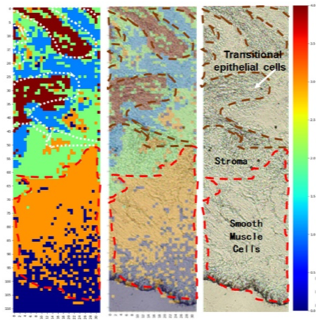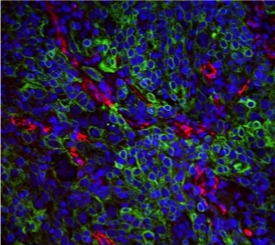肿瘤细胞代谢异常的分子机制 The cancer cell metabolism reprogramming in cancer development
 肿瘤细胞代谢重编程是肿瘤重要标志之一。肿瘤细胞中癌基因的激活和抑癌基因的失活均可导致癌细胞发生不同于相应正常细胞的代谢通路。这给予了人们寻找不同驱动基因引发特异的癌细胞代谢弱点的可能性,以及相应的抑癌靶点的小分子抑制剂设计思路。我们课题组以泌尿系统肿瘤为切入点,采用分子细胞生物学、动物模型和分子影像学技术,深入探讨肿瘤发生发展、复发和转移过程中肿瘤细胞代谢的分子机制。
肿瘤细胞代谢重编程是肿瘤重要标志之一。肿瘤细胞中癌基因的激活和抑癌基因的失活均可导致癌细胞发生不同于相应正常细胞的代谢通路。这给予了人们寻找不同驱动基因引发特异的癌细胞代谢弱点的可能性,以及相应的抑癌靶点的小分子抑制剂设计思路。我们课题组以泌尿系统肿瘤为切入点,采用分子细胞生物学、动物模型和分子影像学技术,深入探讨肿瘤发生发展、复发和转移过程中肿瘤细胞代谢的分子机制。
The metabolism reprogramming in cancer cells is one of the cancer hallmarks. The cancer cell metabolism is quite different from that of normal corresponding cells, partially due to the genetic alterations of oncogene and tumor suppressor genes. This provides the opportunity to identify the metabolic vulnerabilities of cancer cells caused by different driver genes, which may lead to the discoveries of potential small molecular inhibitors. Taking urological tumors as the starting point, our research group uses molecular cell biology, animal models and molecular imaging techniques to explore the molecular mechanisms of cancer cell metabolism in the processes of cancer initiation, recurrence and metastasis.
肿瘤复发和转移过程中肿瘤细胞和环境的互作的分子机制 The interplay between cancer cells and tumor environment during cancer recurrence and metastasis

在肿瘤发生发展过程中,肿瘤细胞和周遭的肿瘤微环境以及肿瘤宏环境存在着密切的关联。我们课题组主要研究肿瘤细胞如何在外部选择压力下,与肿瘤微环境和肿瘤宏环境中诸如成纤维细胞和不同免疫细胞等共同构建适合肿瘤细胞的小生境的机制,以期找寻解除不同外部压力下适宜肿瘤生存的小生境的手段,达到预防和遏制肿瘤之目的。
During tumorigenesis, cancer cells are tightly intertwined with the tumor micro- and macroenvironment. One of our research interests is to understand the formation of niches for cancer cell survival under various selective pressures. The characterization of the molecular mechanisms underlying the interplays between cancer cells and the non-malignant cells, such as fibroblasts and various immune cells, will prompt us to design innovative methods for cancer prevention and intervention in near future.

